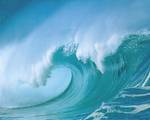
Today, while searching the links posted on the geography 2305 oceans blog, I came accross a very interesting article on salmon farming. Salmon farming which is done from a commerical standpoint to allow for less pricey salmon as well as to allow salmon to be available all year round has been shown to have some very negative impacts. These impacts as shown by the article on the oceans alive website, range from hurting the marine life as well as having negative effects on the human population as well. One such impacts on marine life documented by this article, was the fact that in farming salmon, although it does not directly result in overfishing of salmon from the oceans, it still can lead to lower salmon populations. How does this happen you may ask?, well for starters farmed salmon still have to eat just like any other biological entity. Because of this therfore the raising of salmon by humans results in less prey for the wild carnivourous salmon in the oceans. This is even magnified by the fact that salmon farmers want bigger and better salmon for eating purposes for humans and thus they are fed even more than their wild counterparts. As well not only are salmon populations harmed, but other organisms that use the prey that salmon farmers are feeding their farmed salmon are affected. This therfore has a profound effect on entire ecosystems as everything is connected in one way r another. Think of Dr. Conrad's saying of "pulling strings". The pulling of the strings is people farming salmon, and the impacts in species number can be felt throughout the marine fauna (and to some extent flora, because if organisms can not feed off of their original prey they must find other alternatives). Another reason that salmon farming is not such a great idea, grows from the fact that by feeding salmon excessive amounts of feed that are high in pcbs which can cause many health problems, we are actually hurting our own population. Salmon in the wild do not have this as much of a problem, due to their range of feeding of fish, krill, and other small animals from cleaner waters. Overall, I believe that this example of farmed salmon continues to show how interconnected the entire oceans ecosystems are and how changes in one thing not believed to be hurting the wild can actually have a harmful effect without us realizing it. I believe that people need to really think hard about the consequences that their actions may have on things such as the fauna, flora, and environment of our world. To think, this whole problem spurred from somebody wanting to cash in on humans wants.
Link:

1 comment:
This is a huge and significant issue. The stewardship community on both the east and west coasts are concerned about the declines in numbers of salmon. Our ecosystems are changing and we're helping to speed things up.
Cathy
Post a Comment